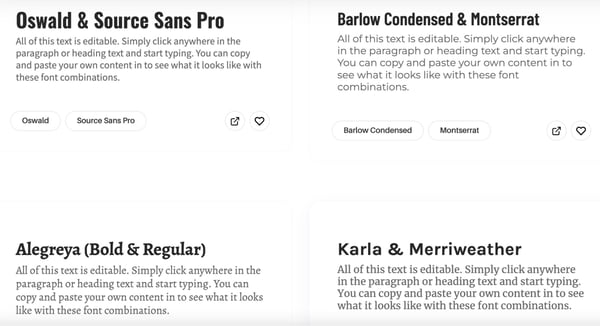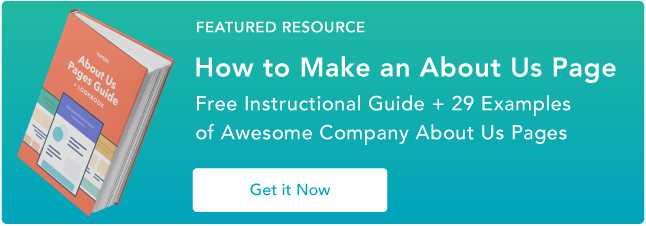Your about page summarizes your history, values, and mission — all in one place. That’s a tall order for just a few paragraphs. If you’re feeling stuck, turn to these about-page examples for inspiration.

In this post, you’ll learn the ins and outs of creating the perfect about page. That includes best practices for writing about your mission, design tips, and templates to emulate.
Table of Contents
Featured Resource: Our 29 Favorite About Us Pages
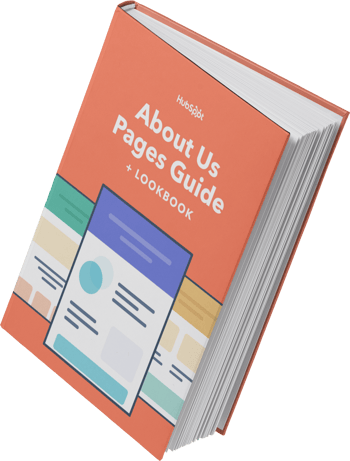
Download the guide to review what we love about these amazing about us page examples, plus a few tips about how to make one of your own.
What makes a good ‘About’ page?
A remarkable about page is genuine, approachable, and distinguished. Visitors should get a glimpse into what working with you might be like. You can include personal interests, stories, and photos that convey the unique story of your business. You may also include information about who’s on your team and what their roles are.
About pages are personal to you and your company, so the structure of your about page will vary based on what you want to highlight. However, you’ll start with the same writing process.
Let’s explore the set-by-step guide to building your about page.
How to Write an About Page
- Establish a mission statement.
- Outline your company story.
- Reveal how you’ve evolved.
- State your “aha!” moment.
- Explain whom you serve.
- Explain what you’re offering them.
- Cite examples of whom you’ve served.
- Describe your values.
1. Establish a mission statement.
Your about page can and will be more comprehensive than a single mission statement. However, to draw people in, you need to succinctly state your goal in the industry up front.
What is your business here to do? Why should your website visitors care? This information will give the reader something to remember about your company long after they leave your website.
2. Outline your company story.
Every business has a story to tell. Even if you’re running a startup with a brief history, you’ll want to share your company’s progress. Talk about how you got to where you are today on your about page.
Pro tip: Isolate the milestones before your company’s founding, and use them to give readers some backstory on your current venture.
3. Reveal how you’ve evolved.
There’s no shame in admitting how your business strategy — or even your way of thinking — has changed since you began. In fact, these evolutions can improve the story you tell to website visitors.
About pages are perfect spaces to talk about where you started, how you’ve grown, and the ideals that have helped your organization mature. Use these moments to show people that you’re always ready to change and adapt to the needs of your industry.
4. State your “aha!” moment.
Every good company was founded on an idea — something the current marketplace might not yet offer. What was your idea?
Use this “aha!” moment as a pivot point when telling your company story. What was a challenge you faced while developing your company? How did this challenge or discovery shape what you are today?
5. Explain whom you serve.
You want as many eyeballs on your about page as possible. However, you won’t do business with every single website visitor. That’s why you must identify and mention your core customer.
Your about page should explain the exact people your business helps. This allows prospects to know if your service aligns with their needs.
6. Explain what you’re offering them.
Companies often generalize their offering in the website copy, making it hard to understand what the customer is actually paying for. In a sentence or two, explain exactly what a potential customer will gain from your business.
This succinct summary will keep visitors on your website for longer and get them interested in learning more.
Pro tip: Sometimes, businesses are afraid that in-depth explanations of their products aren’t interesting enough or will sound unappealing in writing. That’s a fair concern. Start by explaining what problem your offering solves. Then, link to a page with more information.
7. Cite examples of whom you’ve served.
Got some loyal customers in your portfolio? Use your about page to tell the world about them. Consider naming your most successful clients and linking to a case study.
Case studies can influence your prospects’ purchasing decisions since they show your company’s past successes. Plus, they help prospects to envision their future success through the stories of your best customers.
8. Describe your values.
Customers want to be treated like human beings. For that to happen, they need to feel that they’re being served by human beings. When finishing your about page, describe who you are as a person or a team. What’s your company culture like? What bigger picture in life drives your business?
Pro tip: Future employees are a secondary audience of your company’s about page. This is another reason to describe your personal values on your about page. Done right, this allows you to hire job candidates who align with everything your company represents.
7 Tips for Designing a Great About Page
- Choose the right color scheme.
- Include creative visuals.
- Choose the right staff photos.
- Use readable fonts.
- Avoid long paragraphs and sentences.
- Make the page responsive.
- Focus on load time.
A brilliant about page design goes beyond just incorporating your company color schemes. It includes your choice of fonts, visuals, icons, and more. Here are seven tips for designing a great about us page.
1. Choose the right color scheme.
Humans have a natural response to different colors, and the colors you choose can impact your conversion rates. That’s why you need color psychology.
For instance, blue connotes security, strength, wisdom, and trust. Both BlueCross BlueShield’s logo and webpage make use of the color to reinforce that their patients are in knowledgeable hands.
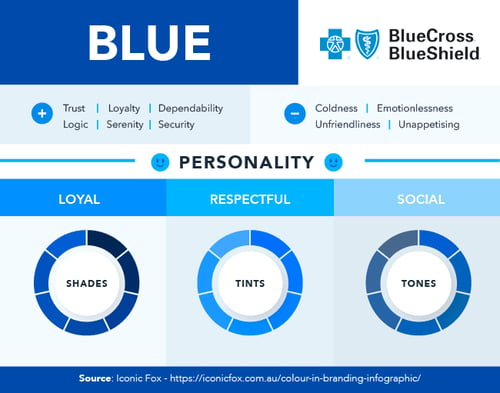
2. Include creative visuals.
The visuals on your about page make your brand more human. What’s even more important is to use visuals of real people, not stock photos. For instance, the HubSpot about us page has an image of our founders.
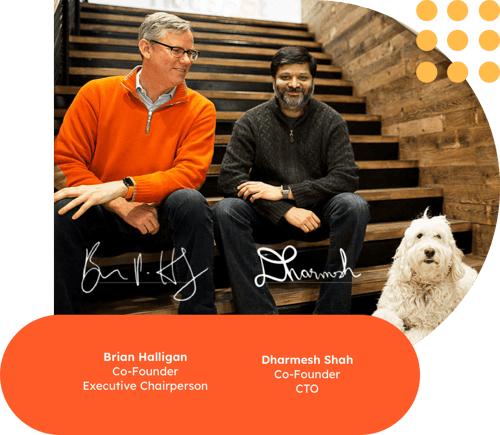
And let’s not forget the cute dog beside our CTO. This photo makes our brand warm to users and helps us show the faces behind the HubSpot brand.
Go a step further by using videos to tell your company’s story. People seek connection. And there’s no better way to connect than to appear on camera. Here’s an example of a video from HubSpot’s about us page.
3. Choose the right staff photos.
Most about us pages include photos of staff — whether that be the C-suite, the founders, or all members of your team. If possible, opt for professional headshots on a neutral background.
Ideally, your team’s photos will have a similar color scheme to your company’s colors. Make sure both headshot backgrounds and your team’s outfits do not clash with the colors already on your site.
Pro tip: If you’re having trouble standardizing your staff photos, consider a black-and-white filter.
4. Use readable fonts.
Finding quality fonts is crucial when designing an about us page. If you want to use more than one font, tools like fontpair will provide you with excellent font combinations.
Additionally, you want to make sure your font is accessible to individuals with disabilities. This ensures all your visitors have a rich experience when going through your about page.
5. Avoid long paragraphs and sentences.
Long sentences and paragraphs make your content difficult for readers to consume. As a general rule, your paragraphs shouldn’t exceed 3-4 lines, and each sentence should be under 20 words.
6. Make the page responsive.
Not everyone will visit your page on their desktop browsers. Many will visit from their tablets and smartphones. Responsive design makes sure your page looks great on all devices.
There are several paid tools to check your about page responsiveness. But if you prefer free tools, this responsive design checker is an excellent option for testing the appearance of your about us page on 26 screen sizes.
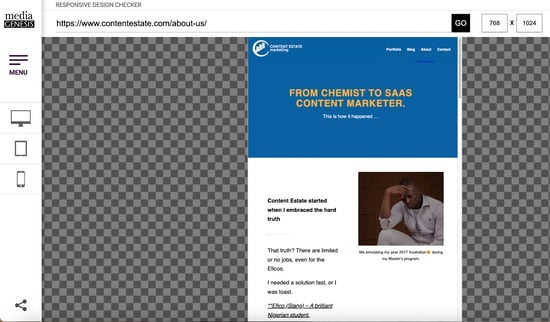
7. Focus on load time.
No matter the size of your business, you’ll want your about page to load fast. If your page takes too long to load, visitors will click away.
You can check your page speed using Google’s PageSpeed Insights. If you find your about page takes too long to load, consider reducing the size of your images.
About Us Page Templates and Examples
About Us Template
You can create an about us template for your company website easily. Here’s how a standard layout for an about us page looks.
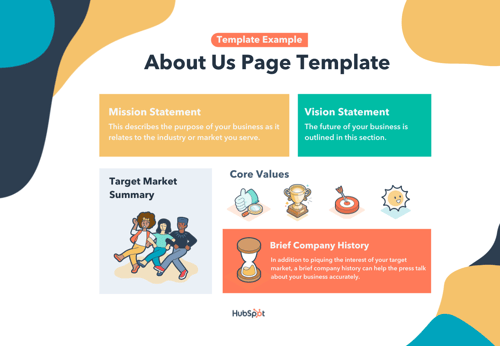
No matter your business, your about page should include:
- A mission statement. This describes the purpose of your business as it relates to the industry or market you serve.
- A vision statement. Outline the future of your business in this section.
- Your values. Core values help the reader connect with you and your business on a personal level.
- A target market summary. Your site visitors want to know that they’re in the right place and that your company can help them.
- A brief company history. Besides piquing your visitors’ interest, a brief company history can help the press describe your business accurately.
After you write a draft, you can use one of HubSpot’s done-for-you website templates to create your about page’s layout. These templates can be installed and customized in minutes.
Done-for-you About Us Page Templates
While the copy is an important element of your about page, you’ll also want to showcase your brand story and identity to the world. These about us page templates create a compelling, customizable user experience.
1. Touraza Template (WordPress)
If you want something with a little flavor, the Touraza template is a tasteful choice. With the “meet the team” section near the top, geometric designs, and striking typography, you’ll be able to showcase the humans behind your brand.
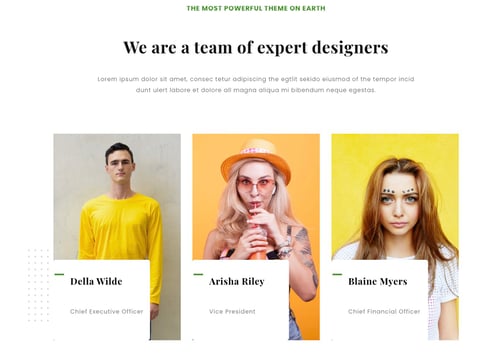
2. Logan Template (Shopify)
This template makes use of large images in a modern layout to break up the ample white space. The result: a clean and enjoyable reading experience.
The top of the page puts the brand story (or other introductory text) first, supported by a large image that speaks for itself. The pops of color can be customized to your brand style, drawing emphasis to your CTA.
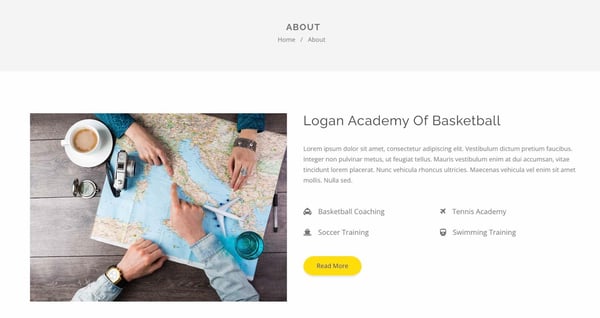
3. Munchies Template (WordPress)
This theme is great for small businesses with a brief company history. You can start by explaining your mission concisely, then jump right into important links.
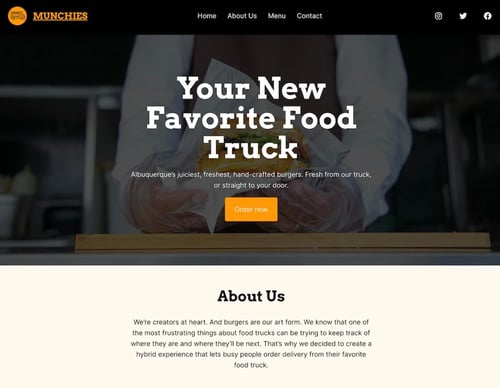
4. Mobirise Template (WordPress)
This visually compelling page allows you to disperse information evenly. The excellent use of white space means there’ll be no giant wall of text to impede readability for your webpage visitors.
You can briefly describe your history at the top of the page. The three icons allow you to lay out your most important values. Plus, the page features a carousel, so you can include headshots and titles for your teammates.
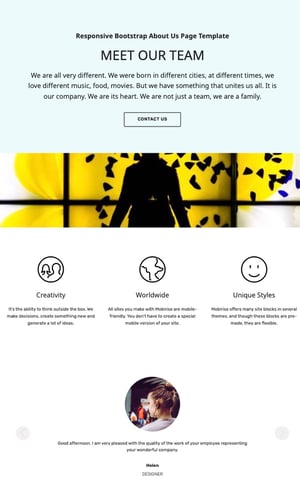
Best About Us Page Examples
1. Yellow Leaf Hammocks
Good stories humanize your brand, providing context and meaning for your offering. What’s more, good stories are sticky — which means people are more likely to connect with them and pass them on.
Yellow Leaf Hammocks tell users about its product by describing how the hammocks empower artisan weavers and their families. The company breaks down different pieces of the story into sections that combine words and easily digestible graphics.
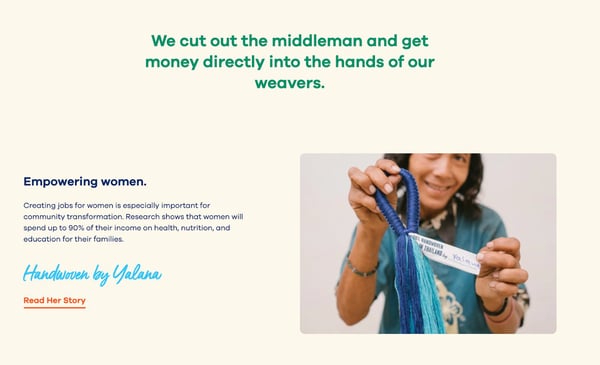
Pro tip: Put your storytelling skills to work on your about us page. Using descriptive and emotive copy and gorgeous graphics, an about us page with a story works harder for your business than a generic one.
2. Eight Hour Day
Some people think about us pages have to sound formal to gain credibility and trust. Well, that’s not entirely correct, because most people find it easier to trust not-so-formal human beings. So keep your us page friendly and real.
Take inspiration from Eight Hour Day. They humanize their brand by showcasing the people behind the company.
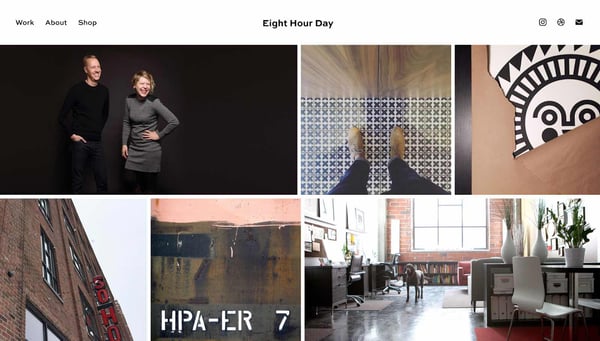
What we love: Introducing the founders with inviting photos on this about us page drives home the point that Nathan and Katie are “two individuals with a passion for creativity — creativity makes us happy.”
3. Apptopia
People want to know what your business does and how it can help them. After all, if people can’t figure out what you do, how will they know they need your product or service?
So, skip the industry lingo — that’s what Apptopia does on its about us page. Their simple but polished language effectively communicates the company’s offering while still allowing the average person to understand it.
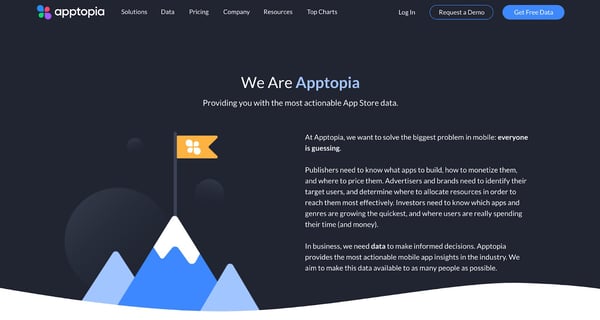
What we love: Apptopia uses short and punchy sentences to explain complex products and ideas in a way that isn’t patronizing. The copy on this about us page leads with empathy.
4. Moz
Instead of following the classic about us script, try something different. Take Moz, for example. A lot has happened since they found the company in 2004. This page shares the company’s milestones using a fun and clean design.
Moz’s about us page incorporates clear headers, concise blurbs, and little graphics to break up the text.
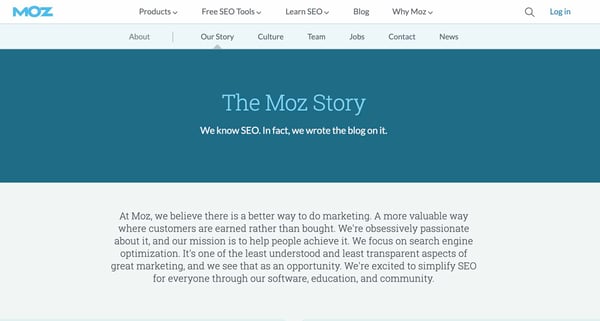
What we love: Note the humble references to how Moz received funding, how it switched its brand positioning — and, most importantly, how it switched back to its original model. This speaks volumes about the value that honesty and humility can play to your customers.
5. Yokel Local
On its about page, Yokel Local spotlights its clients, its story and mission, and the team behind the brand.
This last element is key because Yokel Local knows that its vibe wins over prospective clients. After all, when you hire an agency, you’re hiring its people. And people have personalities.
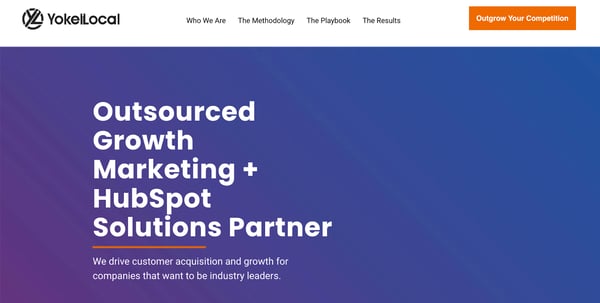
What we love: Because “Yokel Local” is a bit of a kooky name that gives people pause, the company pokes fun at it by providing the definition. This then leads to photos of the team at work (and at play), the agency’s story, its mission and values, and the people who make the magic happen.
6. Nike
Nike began on the campus of the University of Oregon at the hand of the college’s track coach, Bill Bowerman.
Even though he no longer works at the company, one of his beloved quotes still brands the bottom of Nike’s about us page: “If you have a body, you are an athlete.”
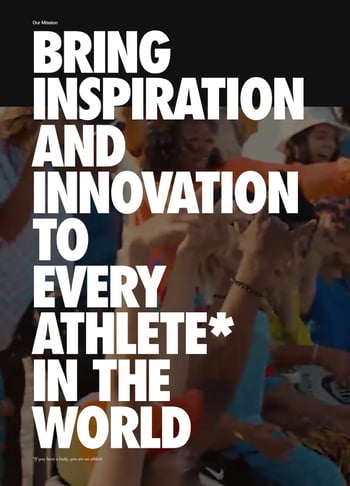
This bold sentence, referenced by the asterisked “athlete” in the words right above it, sheds important light on Nike’s audience.
The brand may be big today, but Nike is all about the rising stars whom the company depends on, according to the rest of its about us page, to “expand human potential.”
What we love: Nike clearly knows its audience and makes its mission obvious to them as soon as they land on the about us page. There’s no question that the visitor is in the right place and understands exactly what Nike has set out to do.
7. Bulldog Skincare
The best about us pages use a good mix of color, have personality, and stay true to a company’s unique brand voice. Let’s look at Bulldog, a skincare brand for men.
The about us page is pithy and leads with a cute bulldog — fitting the name and the brand. It also states the purpose of the products — to help customers from waking up with the (admittedly adorable) wrinkly face you see when you visit Bulldog’s website.
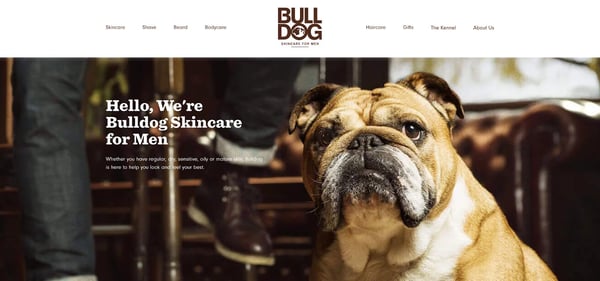
What we love: Bulldog isn’t afraid to have fun with its brand. That bit of humor makes this about us page anything but typical. It primes visitors for a story in a way that makes them immediately feel connected to Bulldog’s mission and vision.
8. Doomtree
Made up of talented artists with thriving solo careers, Doomtree brings these musicians together to work on creative projects as a crew. The group “started as a mess of friends in Minneapolis, fooling around after school, trying to make music without reading the manual.”
As soon as you arrive on Doomtree’s about us page, you’re greeted with big, bold photos of those friends.
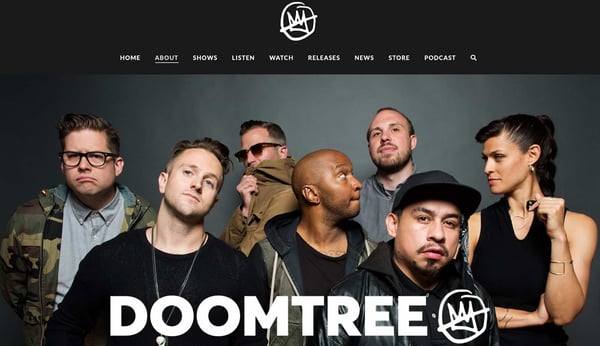
As you scroll down, you get more interaction with the crew’s events and music tracks. That makes sense because it gives visitors an instant sample of Doomtree’s product.
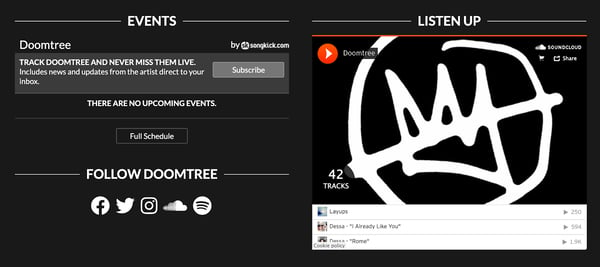
Pro tip: Find ways to use multimedia elements. If a picture is worth a thousand words, a video will be worth many times more. Consider combining your unique story with audio and visuals like Doomtree.
9. Below the Fold
Below the Fold is a company committed to “sharing news stories you aren’t hearing anywhere else.”
With that in mind, the big headline on the about page introduces the company’s purpose. Further down, you’ll find four core values, how the business generates revenue and more details about the team behind the scenes.
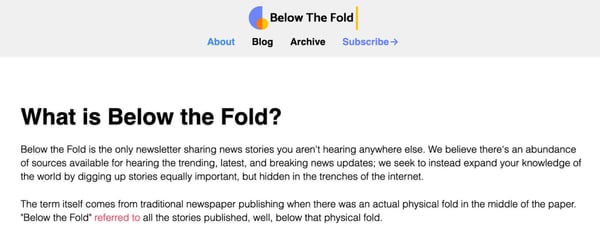
What we love: This page gets straight to the point about what Below the Fold is, who it serves, and why it exists. The simple design lacks color, embellishments, and sensational imagery, so the reader can focus on what the company has to say — a direct nod to the mission statement.
10. Ceros
Ceros’ about us page is interactive and engaging. As you scroll, you see a timeline of the company’s achievements since the year 2006.
Next, there’s the awesome design of awards the company has received. This positions Ceros as the choice brand for potential job seekers.
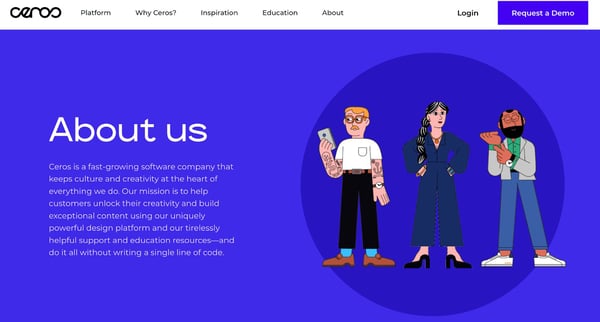
What we love: Ceros keeps the text on the page short and sweet, with powerful statements like “our mission is to inspire & unlock creativity.”
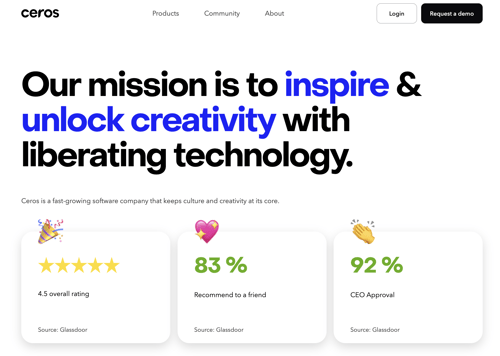
11. Sweet Loren’s
From start to finish, Sweet Loren’s about us page is playful, engaging, and colorful. The page starts with a 60-second video and even incorporates cookie dough-scooping gifs. As you scroll, you’ll move through some of Sweet Loren’s impressive values, including inclusivity and refusing to compromise.
What we love: Sweet Loren’s yummy products are last on the page, ensuring you’re fully primed to purchase only after learning about Sweet Loren’s mission.
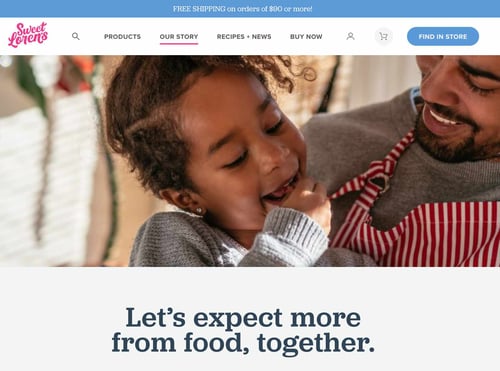
12. TalEx
TalEx began when two women left a major recruiting firm to build their own. TalEx has since seen unprecedented growth at 4,900% in the three years. The company’s about page captures this history and more.
What we love: The company’s emphasis on social responsibility takes up nearly half the page, making this core value clear. The statement explains TalEx’s commitment to donate 5% of its annual net profit to philanthropic organizations. People who visit the website know immediately that giving back is important to the team at TalEx.
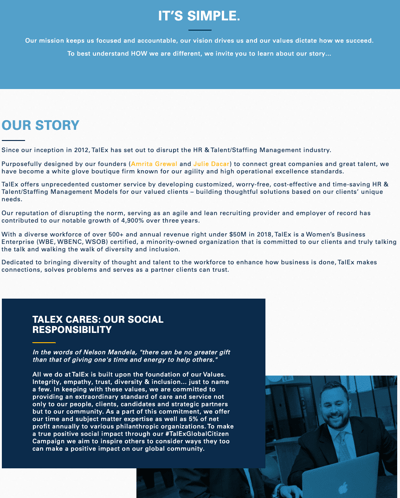
13. LoveBug Probiotics
LoveBug Probiotics’ page effectively includes all the information you’d need on the company to make an informed purchasing decision. That includes how the founder came up with the idea, her personal ties to the vision, and the science behind her probiotic.
While the products are science-backed, the about us page doesn’t confuse visitors with difficult-to-understand facts. Instead, the page is straightforward and helpful.
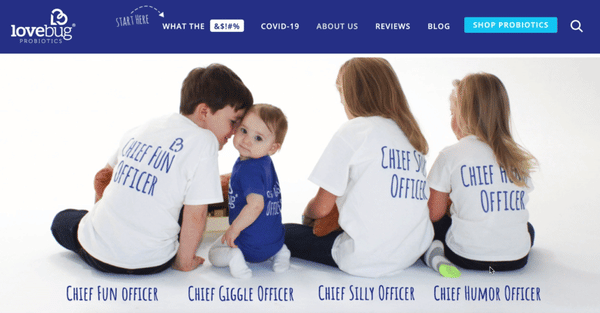
What we love: This about us page features an image of the founder’s four young children wearing “Chief Fun Officer,” “Chief Giggle Office,” “Chief Silly Officer,” and “Chief Humor Officer” T-shirts. There aren’t many pages with cuter introductions than that.
14. Brown and Coconut
Sometimes, simpler is better — as is the case with Brown and Coconut. This about us page features a photo of the two co-founders alongside a few paragraphs of text outlining the brand’s vision.
Brown and Coconut’s about page uses no-fuss language to describe the business.
What we love: Rather than ending with a CTA directing visitors to its products, the co-founders choose to include a CTA for visitors to follow the business on its social channels, thus promoting a more effective, long-term lead generation strategy that starts with brand awareness.
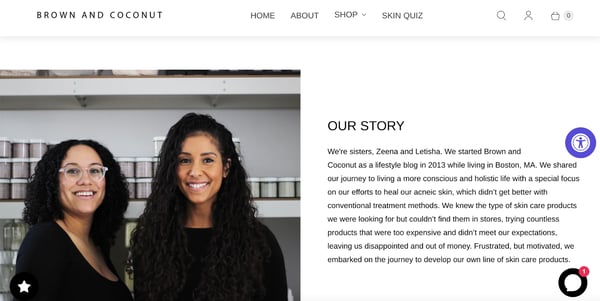
15. Kuno Creative
Kuno Creative’s about page effectively focuses on what makes the company different: its people. While the first paragraph describes the origin of the digital marketing agency, black-and-white headshots of all its employees take most of the page up, along with descriptions of each member.
What we love: If you’re unsure what you want to include on your about us page, consider noting how Kuno Creative focuses on its people, rather than its product. This offers a great way to humanize your brand.
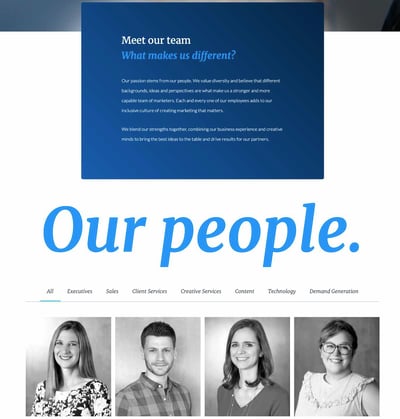
About Me Page Templates and Examples
About Me Template
About me pages vary, but most great pages include a few standard elements. You can see a suggested template from HubSpot below.
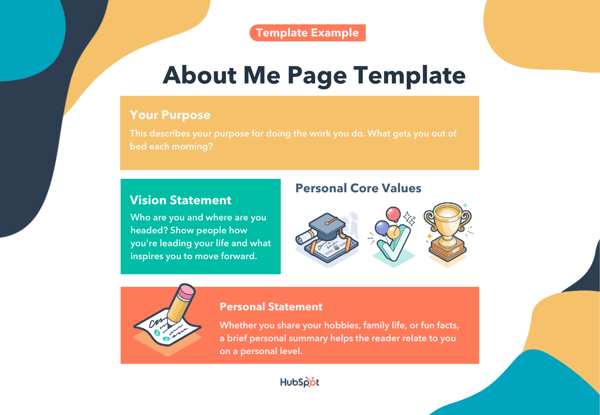
Make sure you include the following information on your page.
- Your purpose. This describes your purpose for doing the work you do. What gets you out of bed each morning? Try using the Ikigai map for guidance here.
- A vision statement. Who are you and where are you headed? Believe it or not, people are looking to you for leadership. Show them how you’re leading your life and what inspires you to move forward.
- Your core values. Personal core values help the reader connect with you and find common ground.
- A brief personal statement. Whether you share your hobbies, family life, or fun facts, a brief personal summary helps the reader relate to you on a personal level.
Next, you’ll see these elements in action in the examples below.
Done-for-you About Me Page Templates
1. Coax Template (WordPress)
The Coax template allows the typography and copy to take center stage. This text-centric approach highlights your personal accomplishments and sells your services. Consider laying out content like a resume with big subheads on the left and descriptive text on the right.
Plus, this template is powered by Elementor, a page builder that makes customization easy.
2. One-page Portfolio Template
Instead of a wall of text, this about me page is neatly divided into separate sections. The text at the top of the page allows you to describe your mission and background.
The icons in the next section call attention to three specific services you provide. Further down the page, you can explain those services in greater detail. You can also include photos to show what you can do.
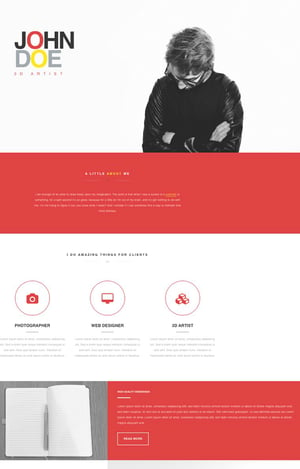
3. Beckham Template
Your about me page should provide a highlight of your accomplishments, as well as an overview of your service. This template can help you put your best foot forward.
The Beckham template includes a suggested place to link your resume, as well as sections to show off previously completed projects.
What we love: Near the bottom of the page, you can show off important numbers. That includes how many clients you have, how many projects you’ve completed, and how much coffee you drank.
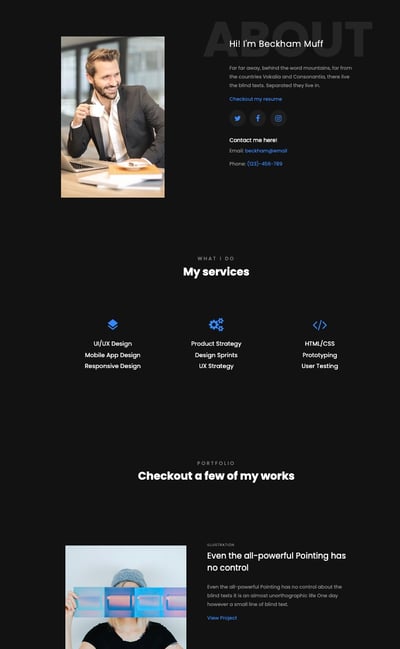
4. Calvin Template
For personal websites, consider placing your contact information front and center. Your visitors shouldn’t have to search to see how they can reach out.
The Calvin template makes integrating your contact information and personal story seamless. This template leads with email and phone numbers, and you can outline your services before including links to your work.
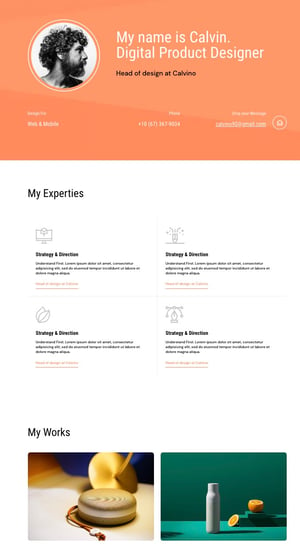
Best About Me Page Examples
1. Joe Payton
The style and tone of your about page should match the services you provide. Let’s look at Joe Payton’s website as an example.
Not only do Joe’s illustrative self-portraits give him a personal brand that customers will remember, but also they show his expertise as a designer and animator. His website visitors can learn what he does in an easily digestible way.
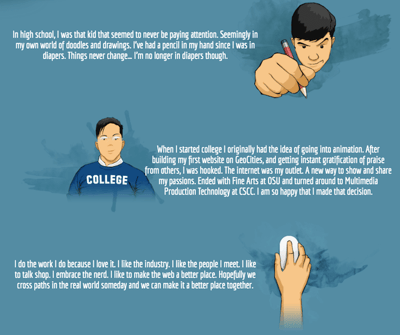
What we love: Joe freely expresses his values as a creative professional on a well-organized page. He tells a story that guides the reader through each section, without having them scroll endlessly to the bottom of the page.
2. Kero One
Kero One is a hip-hop artist and DJ from San Francisco. His about me page carries a valuable lesson to personal brands that cater to over one audience, especially if those audiences speak different languages.
Kero One’s about me page tells his story in English, Japanese, Korean, and Chinese. Including these East Asian languages helps Kero One connect with listeners in these different communities.
Pro tip: If your services are global or your offerings come in multiple languages, consider having your about me page in several languages.
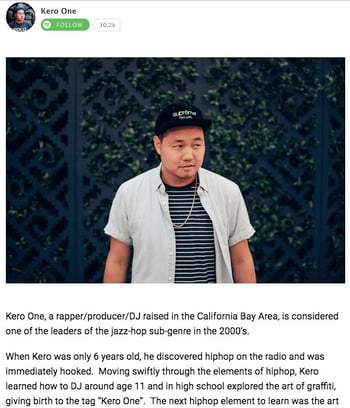
3. Aja Frost
All right, we might be biased in highlighting this professional, as Aja is our very own director of English growth at HubSpot. Nonetheless, the ingenuity she brings to the company isn’t lost on her website’s about me page.
Being a data-driven professional, Aja knows her clients are looking for more than her writing skills.
They want to see how her content has performed. With that in mind, her about me page tells a story of her career growth, which peaks — no pun intended — at an impressive line graph showing the result of an SEO strategy she implemented for the HubSpot Blog.
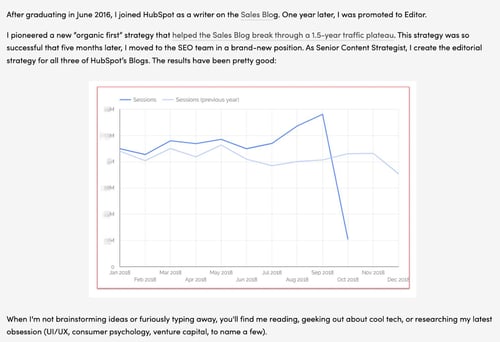
What we love: Aja understands the value of being personable even in a digital space like an about me page. She closes out her about page with a personal note on what she does in her spare time — a great way to humanize yourself in the eyes of your potential customers.
4. Madison Butler
Madison Butler is an HR change-maker “committed to deconstructing the status quo and rebuilding corporate America, one organization at a time.” She does this through her DEI work and her advocacy.
Her about page, which doubles as the site’s homepage, calls this out at the very top in one bold statement: “I am here to ensure organizations know how to make space for everyone.”
What we love: Madison’s about page is effective because it stays true to her mission while being simple, effective, and to the point. The second sentence in the headline, “You belong here,” underscores the inclusivity of Butler’s mission and work.
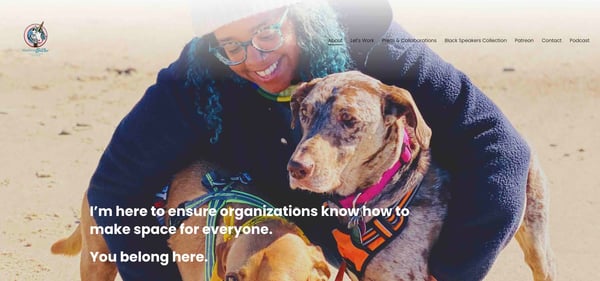
5. Sara Dietschy
This professional YouTube content creator has an eclectic collection of videos related to technology and culture and expresses that diversity all over her about me page.
Besides the vibrant self-portrait at the top of the page, Sara’s first sentence tells you just how many people subscribe to her channel: 835,000.
This is an important number to know for her potential video advertisers and collaborators who want to know how much exposure they’d get by working with her or advertising on her channel.
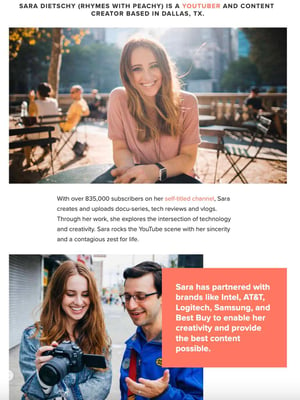
What we love: The color text on her page highlights key information. This helps the reader navigate the page and understand what’s important for them to know.
6. ShaDrena
ShaDrena is a graphic artist whose mission is to “visually build creative rebellious brands beyond a logo.” In three sections — about, bio, and random facts — the audience gets the full ShaDrena experience, which is more than just design. It’s also about voice and personality.
As a self-described “creative hustler,” “rule-breaker,” and “designer of dope brands,” the language ShaDrena uses on her site comes across as edgy and authentic.
What we love: ShaDrena’s about page is counterintuitive to what someone might expect from a graphic artist. ShaDrena presented most of the content in black, white, and gray, which puts all the focus on the composition of her design.
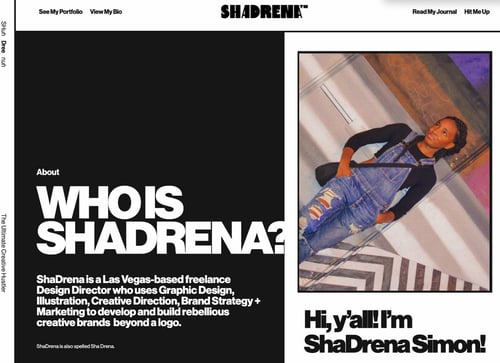
7. Marc Ensign
On his about page, Marc Ensign takes his work seriously without taking himself too seriously. Marketers know there’s value in keeping a casual tone in the content they create, but to attract customers, you need to prove you have discipline and integrity. This often proves to be a tough balance to get right.
What we love: Marc Ensign nails the balance between friendly and formal with a confident opening statement. This draws the reader in and establishes Marc as a relatable partner to work with.
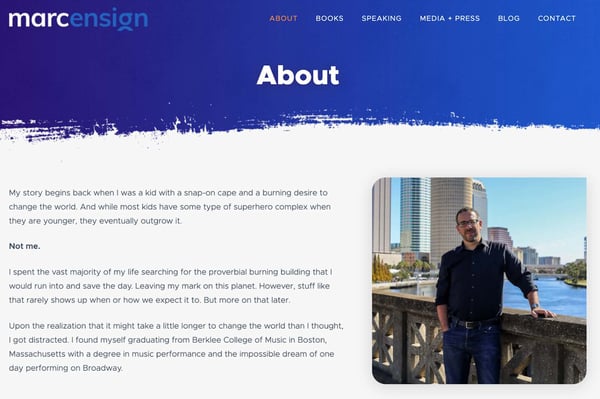
8. Miracle Inameti-Archibong
With an excellent design that emphasizes her copy, Miracle Inameti-Archibong’s site is a master class on how to do a one-page website well. Miracle presents the content with large clear images, bold colors, dynamic angles and blocks, and simple typography.
What we love: Miracle’s about me section spans over a decade, but it’s laid out in just four sentences. The reader can easily understand her career span without being overwhelmed with excess information.
9. Haley Shapley
Haley is a freelance writer and editor who uses a single-page format for her website to showcase her personality, writing samples, and professional services. The site also features a very cool animated video effect in the background, creating a sense of space and movement.
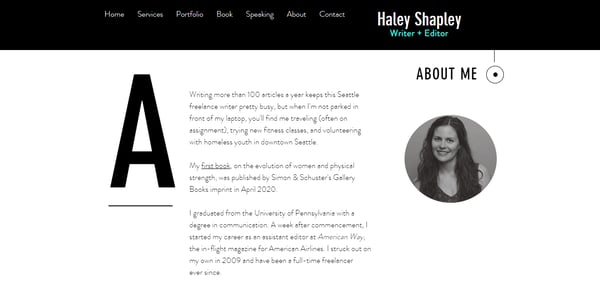
What we love: Haley leads with an important number: She can write over 100 articles a year. Starting with an impressive data point helps show her level of experience.
10. Amy Blaschka
Amy Blaschka’s portfolio features plenty of white space, balanced out with a bright blue header that really pops, and orange buttons for conversion actions (i.e., “Let’s talk”). Her use of video to explain what she does also helps her stand out in a crowded space.
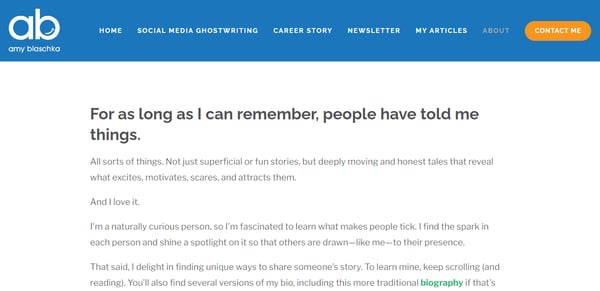
What we love: To showcase her creativity and individuality, Amy has a list of bullet points of things she loves and things she doesn’t love. She also provides website visitors with three (yes, three!) different versions of her bio: a short one (under 75 words), one that’s longer (under 150 words), and her full bio, which takes up an entire page.
By doing this, she’s showing her talent for crafting messaging and educating prospective customers about who she is. Very sneaky, Amy!
11. Cathy Derus
Cathy Derus’ site features bold images and crisp text. The site also highlights Cathy’s appearances in major media outlets and publications, like Entrepreneur and Cosmopolitan.
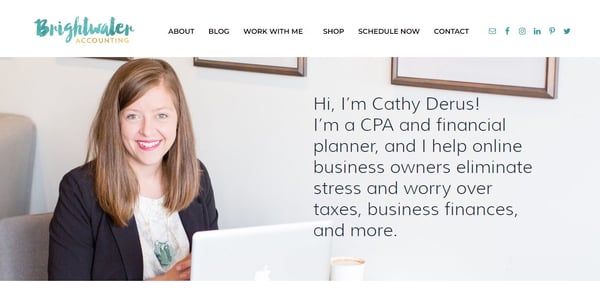
What we love: Cathy’s about section features a full-page image of Cathy on her laptop, with a brief text introduction directly to the right of her. Instead of breaking up the image with text, Cathy overlays the text on the actual image, so website visitors get the feeling they are actually in her office with her. This is a great way to build credibility.
12. Matt Gray
Matt is a serial entrepreneur who now manages a portfolio of “soulful businesses.” His website promotes the paid courses he’s developed for entrepreneurs and the one-on-one coaching he provides to those looking for a more personalized touch.
Matt’s site provides plenty of content to help visitors understand who he is and what he does. The focus of the site is very simple: to get visitors to convert by signing up for his email newsletter.
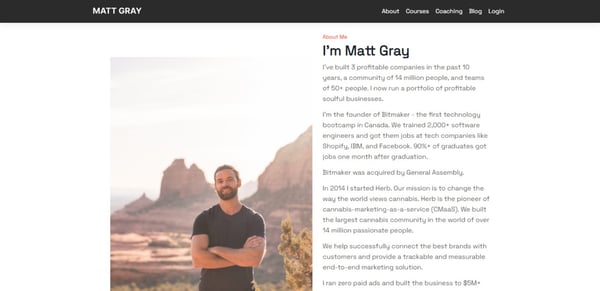
What we love: Below the bio section, Matt breaks down his offerings in a simple 1-2-3 format, providing something for everybody. Lower on the page, visitors find a mailing list sign-up form with a commitment of what subscribers will receive by signing up.
Tell the World All About You
Now that you’ve seen examples, it’s time to build your own about page. With a good story to tell, creative copy, humility, and digestible visuals, you’re on your way to an eye-catching user experience.
You’ll be standing out from a sea of about us and about me pages in no time. So, tell us, what makes you different? We’re eager to learn more about you.
Editor’s note: This post was originally published in October 2020 and has been updated for comprehensiveness.
Source link




![→ Download Now: About Us Pages Guide [Free Lookbook]](https://no-cache.hubspot.com/cta/default/53/f3ca18eb-3e09-4cf6-9f6b-c23d8a48a49a.png)
